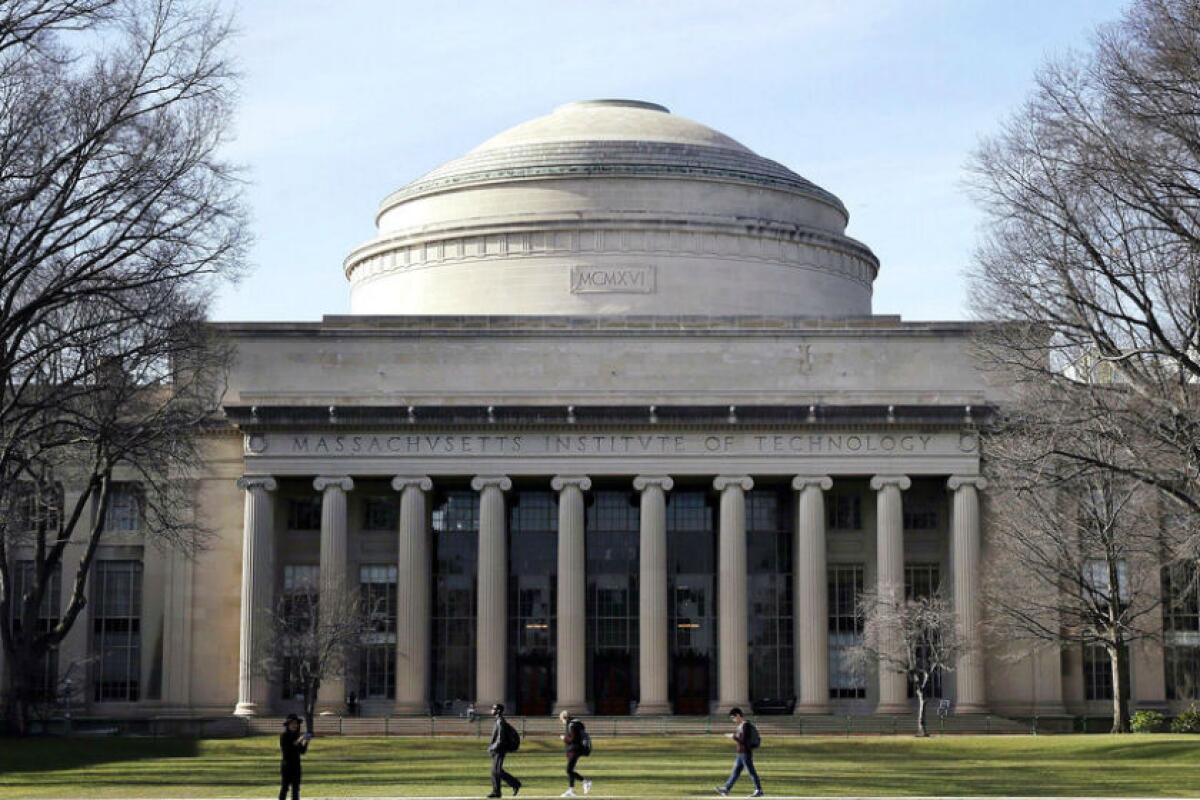Op-Ed: The quandary of U.S.-trained Chinese scientists: Stay or leave?

- Share via
Would you train your workers and then squeeze them out by creating a hostile environment? Would you drive out these workers so they can go work for a competitor? The answer is obviously no. Yet this is what’s happening now in the U.S., with a rising number of U.S.-trained Chinese scientists leaving this country.
In 2021 alone, 1,400 U.S.-trained scientists have left their corporate positions or relinquished tenured positions at top-tier American universities such as Harvard, MIT and Princeton. This trend has grown since former President Trump promoted anti-China rhetoric during his term. To make things worse, many of these Chinese scientists are returning to China to compete against the United States.
At the same time, the flow of Chinese students to the U.S. is declining. During the first six months in 2022, the U.S. issued 31,055 academic visas to Chinese nationals, down from 64,261 for the same period in 2019. Chinese students make up 16% of all U.S. students in STEM fields, and a significant percentage of STEM workers in the U.S. are of Chinese descent, which means this problem could affect STEM fields for years into the future.
The House has passed a $280-billion package to boost the semiconductor industry and scientific research in a bid to create more high-tech jobs in the United States and help it better compete with international rivals, namely China. The Senate approved the bill a day earlier.
The departure of U.S.-trained Chinese scientists and the reduced numbers of Chinese students could hinder the plan to revitalize domestic semiconductor manufacturing and electric vehicle manufacturing. These trends will also weaken the ability of the U.S. to compete with China in science and technology, especially when China is already leading in several key scientific metrics such as the number of patents and the number of papers published.
Why would these U.S.-trained Chinese scientists give up their secure and prestigious positions in this country? Why do Chinese students seek their higher education elsewhere?
First, mistrust and the hunt for spies among Chinese Americans have long been present in U.S. history. And the distrust of China has soared since the start of the COVID-19 pandemic. Trump stoked suspicion and fear about China, and President Biden received bipartisan support to view China as a “strategic competitor.”
Under the Trump administration, the Department of Justice launched a program called the China Initiative in 2018 that was intended to counter theft of U.S. secrets and technology. Many scientists of Chinese descent have been falsely accused of spying for China, and many of them have been interrogated by FBI agents.
For example, Gang Chen, a professor at MIT, had federal charges against him dismissed after undergoing a lengthy espionage investigation. These cases have had a profound effect on Asian American academics, especially those of Chinese descent. Even though the China Initiative program ended this year after intense public outcry, fear and the perception of the U.S. being a hostile environment continues.
Second, putting political risk aside, many Asian Americans, despite having a strong presence in corporate America, are virtually absent in the executive suites and feel least included at the workplace. In fact, Asian American workers are the least likely group to be promoted to management — even less likely than Black and Latino workers.
Asian American professionals and scientists, including Chinese Americans, are often portrayed as well-educated, hardworking, successful. Yet they remain underrepresented in leadership roles and are regularly left out of discussions about discrimination in the workplace. In fact, Asians are often excluded in diversity and inclusion plans entirely.
This climate makes many Chinese scientists and professionals feel pessimistic about their prospects in the United States. They may, however, be more optimistic about China when Chinese universities and companies are offering them senior positions with attractive benefits.
Finally, many people of Chinese descent feel they have been made scapegoats for the spread of the coronavirus. This negative sentiment has triggered a staggering increase of hate crimes against Asians — by 339% in 2021. The murder of Shaoxiong Zheng, a Chinese student, near the University of Chicago’s campus in broad daylight in 2021 sent a shock wave through Chinese students in the United States. Heightened safety concerns over hate crimes against Asians have nudged more Chinese scholars to leave and discouraged Chinese students from coming to the U.S.
The dynamic causing Chinese scientists to leave now, in some ways, recalls the dreadful case of Qian Xuesen, the MIT-trained rocket scientist and co-founder of Caltech’s Jet Propulsion Lab. He was accused of being a communist sympathizer, and placed under house arrest for five years before being deported to China in 1955. There was no evidence that he was a spy. Upon returning to China, Qian helped China to develop its first nuclear weapon. Former Navy Secretary Dan Kimball later lamented that the treatment of Qian was “the stupidest thing this country ever did.”
Regardless of current tensions between the U.S. and China, the long-term public interest surely lies with promoting policies that would help retain the best U.S.-trained scientists in this country.
Christopher S. Tang is a University Distinguished Professor and Edward W. Carter chair in business administration at the UCLA Anderson School of Management.
More to Read
A cure for the common opinion
Get thought-provoking perspectives with our weekly newsletter.
You may occasionally receive promotional content from the Los Angeles Times.











